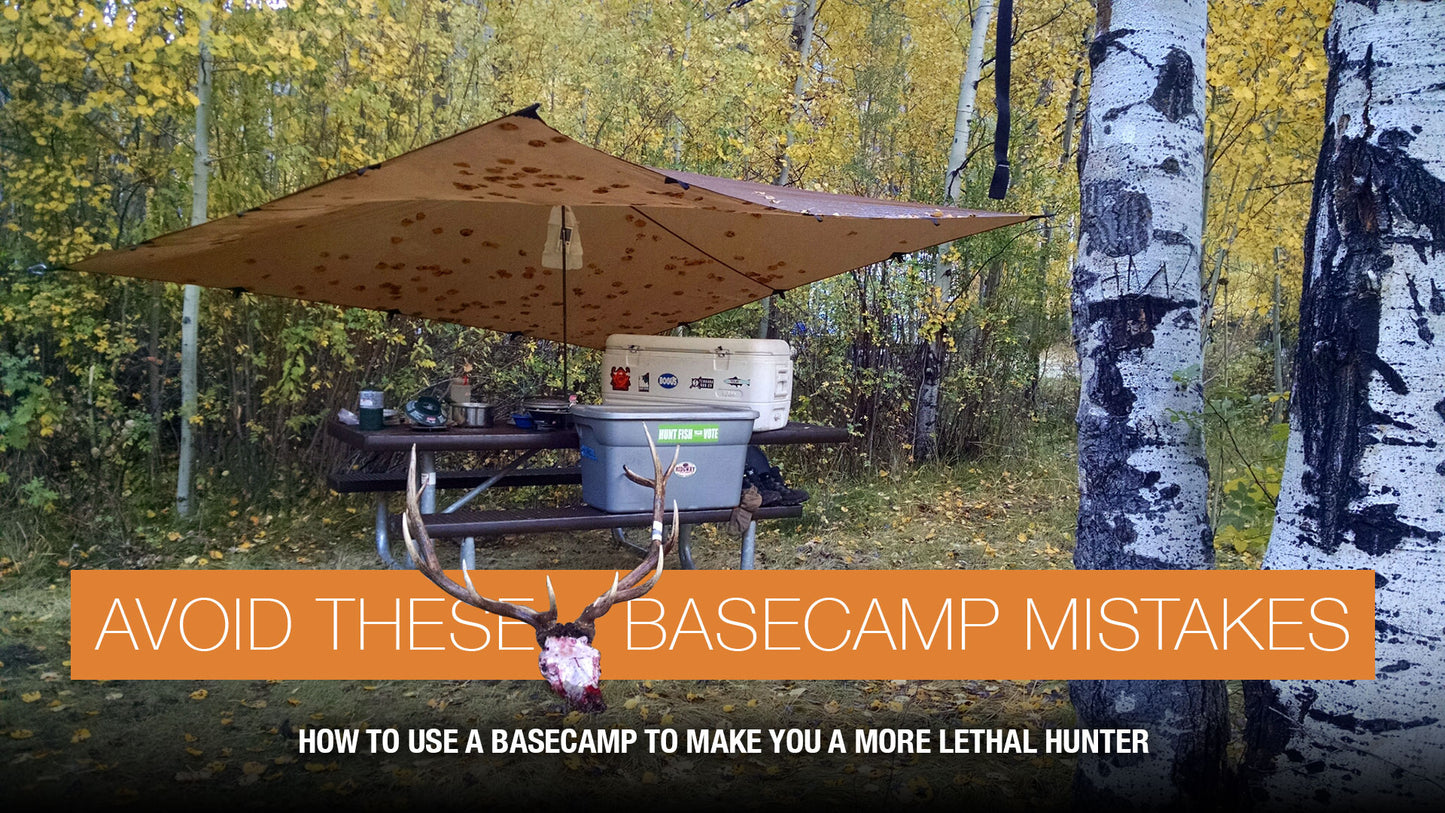
We are hunters that love to backpack deep into the backcountry, but there are times that a basecamp is an invaluable aspect of our hunts.
Most backcountry hunters invest a lot of time and effort to carefully plan every item that goes into their pack for backcountry hunts, but it isn't as common for hunters to think critically about how they put together their basecamp. This article, along with the podcast included below, will help you consider how to plan and execute an effective basecamp for your next hunting adventure.
The Benefits Of A Good Basecamp...
Before we talk about how to use a basecamp, let's quickly talk about the main benefits of using a base camp. Looking at the big picture, there are two primary ways that an effective basecamp can help you on your hunt…
- Increase the amount of time you can spend actually hunting during a trip
- Increase your physical and mental performance
We will explore those two benefits more in the article below. And in addition to this article, check out the Hunt Backcountry Podcast conversation that Mark & Josh (co-authors of this article) recorded on this topic:
This podcast addresses many of the topics discussed below, as well as additional details and stories that are not mentioned in the article.
Building Your Basecamp...
There is no such thing as a perfect “one size fits all” basecamp setup. Your basecamp should be tailored to the unique factors of the specific trip that you are planning, and consider other variables such as your budget, vehicle, and personal preferences.
When selecting the gear and other components of your base camp, use the same philosophies that you would use when planning a backpack hunt [LINK] and try to strike the right balance between: Utility, Comfort, Weight, Space, Cost, Ease of Use, Functionality, Energy Needs.
Some basecamps are simple and spartan; others are more extravagant. More than your preference, though, consider these factors when deciding how simple or complicated to make your basecamp…
When to go with a bigger and more complicated base camp...
- Long duration trips
- High level of knowledge about the area you're headed to
- High level of confidence that you will secure a good camp spot that fits your setup
- Low likelihood of changing locations during your trip
- Bad weather expected
- Higher priority for comfort
When to go with a smaller and simpler base camp...
- Shorter duration trips
- Lack of knowledge about the area you're headed to
- Questionable confidence that you will secure a good camp spot that fits your setup
- High likelihood of changing locations during your trip
- Good weather expected
- Higher priority on mobility

The Top Priorities for MOST Hunting Basecamps
Before we share any specific gear items or recommendations for your basecamp, think about the main functions that your basecamp should provide. These are our top priorities in a basecamp...
- Adequate meat care plan
- Backups of key supplies
- Simple and fast systems to cook, eat, and sleep
- A sheltered area for cooking, resting, and congregating in bad weather
- A sure-fire way to warm-up and dry-out (drying yourself and your gear)
- The space and storage to keep camp clean and organized
With those priorities in mind, here is some of the essential gear that Josh includes when planning basecamp hunts...
- Coolers and ice, with a predetermined plan to keep things cool
- Dedicated sleep system (shelter, sleeping bag, and sleeping pad or cot), which is separate from my backpacking sleeping gear
- Dedicated stove, fuel, food, beverages, and hygiene supplies, again, separate from my backpacking gear
- Dedicated clothes and footwear for in camp
- Tarps, guy lines, straps, and telescoping poles, allowing me to create shelter and structure for cooking, gear storage, shade, etc
- A simple table, which is very useful for cooking, cutting meat, and organizing gear
- A camp chair
- Lighting for both utility and ambiance
- Propane heater
- Battery operated fan, for drying, cooling, and reducing condensation in the basecamp shelter
- A good shovel for digging poop holes, leveling truck, removing waste or rocks, and fire management
- Backups of key gear hunting and backcountry gear, such as hunting clothing, boots, binos, ammo, release, knife, repair kits, etc
- Organizational and storage supplies, such as bins, duffels, etc
- Personal luxuries, typically including a towel & shower nozzle, a massage gun and other self-care items, books or magazines, and a plastic folding toilet seat frame
Note: Josh discusses many of these items, and more, in further detail via the podcast conversation included above.

Avoid These Common Mistakes...
To conclude, let's assess some of the mistakes that can be made when putting your basecamp plan together. Remember, each basecamp and each hunt may be different. It is helpful to assess each trip as a unique opportunity and think through some of the ways that a basecamp can help or hinder your hunt. Here are some of the ways things can go wrong with a basecamp…
Your basecamp is too complicated and takes too much effort. Bigger, more complicated basecamp setups often mean less time, energy, and even money available for hunting. Big vehicles, large camper trailers, and tedious wall tent setups will limit your options and slow you down. If there's a significant time commitment to set up and tear down your basecamp, you are losing hunting time. Also consider that the more gear you have, the more that can go wrong.
Your basecamp is too spartan and doesn't provide enough comfort. You are far more likely to head home from your hunt if you don't have the ability to get comfortable and dry. Other comfort items, such as food, beverages, clothes, and even a relaxing chair by the fire may give you the extra boost you need to keep hunting when conditions are tough.
Your basecamp limits versatility and mobility, which is especially important on public lands. If you only have a “Plan A” for your camp, you are in trouble. Alternatives are required as you prepare for the unexpected: other people, fires, livestock, weather. The ability to move your basecamp with quick setup and teardown is a huge asset. And having gear that works in a wide variety of camp spots is incredibly beneficial.
You don't pay enough attention to the details. As the phrase goes, “"The devil is in the details.” Be sure that you are paying attention to the weather forecast and that you have a plan and appropriate gear for inclement weather. Be sure that you have researched seasonal closures, regulations, restrictions, fire conditions for the area that you're heading into. Be sure to include adequate quantities of food and beverages, as well as extra/backup gear.
You are not prepared for hunting success. How long can you store meat at basecamp before you need to leave to resupply on ice or get the meat to a processor? Do you even have enough cooler space for the meat? There are some very detailed tips on this topic in the podcast shared above.
You didn't pre-plan and communicate well enough with your hunting partners. Without this planning and communication, you are more likely to forget key items, or have too many duplicate items that should have been pared down. Beyond gear, you also need to communicate about specific locations, backup locations, timing or arrivals, and similar details. Finally, you need to be sure that everyone in camp has realistic expectations for both camp life and for the hunt itself.

Better Basecamp, Better Hunting
We hope that this information will help you plan a better basecamp, and therefore, experience a better hunt on your next trip. If you have any questions on this topic or would like to share some basecamp tips that have worked well for you, share those with us by sending an email to: podcast@exomtngear.com. You can also reach out to Josh on Instagram: @josh.kuntz.
